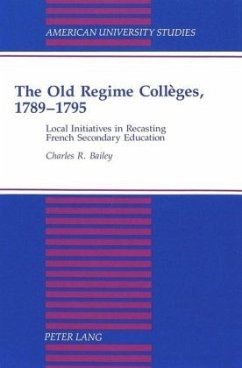This book demonstrates that the condition of the provincial French collèges during the Revolution contrasted sharply with the expectations of legislators sitting in Paris. The latter consistently endeavored to create a system of secondary education, but they succeeded only in establishing (after 1795) an inadequate number of écoles centrales . Meanwhile a majority of the collèges - faced with problems of divided administrators, insufficient money, scarce teachers, and vanishing students - ceased to operate. Yet, some local authorities reorganized their schools and provided for them a progressive new curriculum. In general, centralizing tendencies doomed important local attempts at reorganization, perhaps to the detriment of the future of French secondary education.





